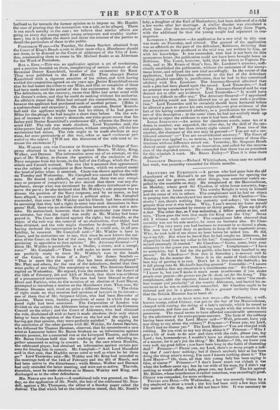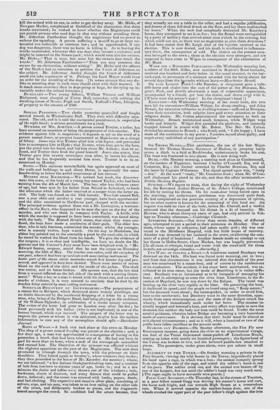LECTURES ON CURIOSITY.—A person who bad gone into the old
churchyard of St. Michael's to see the preparations for opening the Bridge, and the graves, and other things, u-as somewhat rudely ex- pelled by the constable on duty. He complained at the Blansionhouse, on Monday, where good Sir Claudius, of white horse notoriety, hap- pened to sit as locum tenens. The worthy Knight is witty in himself and the cause of wit in others. The complainant said he had no object in peeping into the churchyard but mere curiosity. Sir Claudius—" Cu- riosity ! aye, there's nothing like curiosity now.a-days ; 'tis ten times greater than ever it was before. Why, I can't mount my horse myself without being surrounded by twenty or thirty people. Upon my life it's a fact. The other day, as I was mounting, a fellow Points at me, and says, There goes the man that made the King cut the City.' Never did I witness such curiosity." The complainant here observed that curiosity was not his sole motive, he went on business also. Sin- Clan- dins—" I'm very sorry you had business to transact inn so dismal a place. The man has a hard duty to perform to keep all the vagabonds away. Why, he took hold of me about an hour before he seized you. He did, upon my life. But when he heard that he had caught an Alderman, he slipped his hand from my collar to his hat." Complainant—" I consider myself extremely ill-treated." Sir Clandins—" Come, come, bury your animosity in the grave you were looking into." Complainant—" I have no animosity, but I feel for the public, who have been insulted in my person." Sir Claudius—" Now this is Saturday ; to-morrow will be Sunday; let the matter die. Inter it in the name of God—that's the best way of putting it to rest. Don't let it live into the Sabbath ; let it fall plump into St. Michael's burying-ground." Constable—" I assure your Lordship that my situation is a troublesome one." Sir Claudius-,-- " I know it, but you'll make it much more troublesome if you shake people over graves—the graves are for the dead, not for the living." The complainant, adds the reporter, found it impossible toresist "the excel- lent temper and jocularity" of the worthy Alderman, and buried his re- sentment as he was so judiciously counselled. Sir Claudius ought to be ticketed and put in a glass-case. He is a greater curiosity than any that the British Museum has to boast of.
NONE so DEAF AS HE TIIAT WILL NOT nsan.—On Wednesday, a well. known scamp, called Chinny, was put to the bar of the Mansionhouse, charged with cutting the string of a lady's reticule, which he tossed to a companion, and then ran off. He was caught with the scissors in his possession. The rascal seems to have afforded considerable amusement by the adroitness of his cross-purpose answers. The facts of the robbery having been stated, the Lord Mayor said—" Well, prisoner, have you any thing to say about the robbery?" Prisoner—" Please you, my Lord, I ban% had no dinner yet." The Lord Mayor—" You are charged with robbing. Do you wish to say any thing about it ?" Prisoner—" Why I gets a bit of work to do now and then with the cads, please you, my Lord ; but, howsomdever, I wooldn't have no objection to another sort of a master, for it an't jist the thing." Mr. Hobler—" Oh, we know youz very well, my good fellow ; you have been long in the habit of shamming deaf." Prisoner—" Please you, my Lord, there's so many people a talk- ing that I can't hear nothing; but if there's anybody here as has been doing the thing what's wrong, I'm sure I knows nothing about it." The Lord Mayor—" Oh, then, all that this young lady has been saying is false, of course ?" Prisoner—" I don't know exact vot o'clock it vu when the hofficer came up ; but he vas wide of his man, for I didn't say nothing as would offend a babe, please you, my Lord." The hit against Mr. Hobler, whose interference is rather notorious, was exceedingly good. Chinny was remanded, for more evidence. TRUCKS AND Doos.—On Wednesday, a boy was severely bitten by a dog employed to draw a truck ; the boy had been only a few days with the master of the dog, and it did not know him. It was necessary te kill the animal with an axe, in order to get the boy away. Mr. Hicks, of Newgate Market, complained at Guildhall of the obstruction that these trucks occasioned; he wished to know whether. the Magistrates enild not punish persons who used dogs in that way without muzzling then. Mr. Alderman Farebrother thought the magistrates had no power to enforce the nuzzling. A person suffering a mastiff to go at large nn- 'muzzled was indictable at common law; and he apprehended, if any "dog was dangerous, there was no harm in killing it. As to leaving the trucks unattended, whenever this was done they became a nuisance, and might be removed to the Green-yard; which would soon tire the owners.
• Mr. Hicks—" That is true, but none but the owners dare touch the trucks." Mr. Alderman Farebrother—" Then you may summon the owner for an obstruction, without seizing." Mr. Hicks said the officers of the Market had an intention to petition the Court of Aldermen on the subject. Mr. Alderman Ansley thought the Court of Aldermen could not take cognizance of it. Perhaps the Lord Mayor would issue an order for the muzzling of the dogs. [It seems strange that any dis- like to muzzling dogs in such cases should exist with their masters. It is much more necessary than in dogs going at large, for the tying up in- ' variably makes the animal ferocious.]
BURGLARY.—Two young fellows, William Vincent and William Richmond, were charged at Union Hall, yesterday, with robbing the
• dwelling.house of Messrs. Pugh and Smith, Tuffnall's Place, Islington, of property to the amount of 250/.



























 Previous page
Previous page